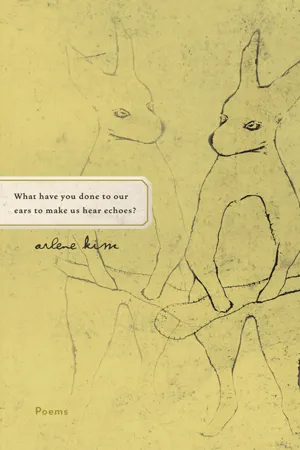
- 112 pages
- English
- ePUB (mobile friendly)
- Available on iOS & Android
About This Book
This debut poetry collection blends fairy tales with Korean folklore as it examines the experience of immigration and identity. In her stunning debut poetry collection, What have you done to our ears to make us hear echoes?, Arlene Kim confronts the ways in which language mythologizes memory and thus exiles us from our own true histories. Juxtaposing formal choices and dreamlike details, Kim explores the entangled myths that accompany the experience of immigration—the abandoned country known only through stories, the new country into which the immigrant family must wander ever deeper, and the forked paths where these narratives meet and diverge. Sharing ground with Randall Jarrell's later poems, and drawing on a dizzying array of sources—including Grimm's Fairy Tales, Korean folklore, Turkish proverbs, Paul Celan, Anna Akhmatova, Antonin Dvorak's letters, and the numerous fictions we script across the inscrutabilities of the natural world—Kim reveals how a homesickness for the self is universal. It is this persistent and incurable longing that drives us as we make our way through the dark woods of our lives, following what might or might not be a trail of breadcrumbs, discovering, finally, that "we are the only path." Winner of the 2012 American Book Award Praise for What have you done to our ears to make us hear echoes? "Using fairy tale archetypes like axes and keys, and diverse cultural references—from the Romanovs and code ciphers to Korean birth rituals—Arlene Kim recasts the experience of family immigration in language that manages to be both lush and restrained. This is a book to savor, give your friends, and let echo in your ears for a long time to come." —Katrina Vandenberg, author of Atlas "In this young century, American writing has rapidly changed and the impact of this book proves Arlene Kim is a part of this exciting transformation. Her poetry and prose challenge the concept of genre as they redefine the role of the imagination." —Ray Gonzalez, author of Muy Macho
Frequently asked questions
Information
Needle
husband, and the sewing-
machine. “This,” she thought, “can keep us together until it is done.”
And by this, she
meant
the hem, piecing torn parts; by
this, she meant the ripping of land, seam by seam,
orphaned
threads splayed. All
she took, she hoisted on her back
she held on her head. She tread
road, just barely at times, the pace
ongoing, like
muslin through the feed-
dogs. Outrun
the seam ripper. Her
husband the presser foot; her girls, small
bobbins. What was
left for her
but to be-
come
the
needle.
for peopling in four-sided polygons, in right angles, nearly. But then
the forest. What doesn’t sit straight, pace neat in known lines. Even
when she has nothing, she saves
scraps, practices passing
thread
through the eyes of her girls—
old patterns to keep
sharp.
Reasons We Left
in smoke. This is what flesh becomes:
a warning. A charred aspen.
makes a hollow call. Old horse trickery.
unconcerned over each crocus
chewed by plague, by footpath.
flammable, so light, we are the orphaned ones of lovers.
to my eardrums, dried them to my cochlea.
Mane of music—never not amazing.
rises like bread. We wait to harvest
what grows, but we are not the only ones.
in the patterns of the young, meandering,
as we do these days, thought-to-thought, uninformed
but surrounded by facts, leaving now and then
a tallowy trail.
Because we had but a dried heel of apricot remaining among us.
Because the way was lit only by hard stones.
Because we found the false axe and did not want to go back.
Answers to the Proust Questionnaire
In many majesties of sound
you most dislike? What faults
do you most indulge? What
do you most admire
in a man?
in a woman?
Q. Favorite name?
Favorite
bird?
Q. Present state of mind? Q. Lowest depth of misery?
milk-fried, de-buzzed, mummified
, sanitized, swatted, twitching, octopi’d
, then occupied, then
a piper’s lie, beauty unpied,
beauty unpied, beauty unpied beauty unpied
standardized, pig-sty’d, pigeon-shyed, wing tied
& tied & tied to Mother’s tide, dragged
along a gutter’s side, tongue-bitten ride, all time to bide,
tax -onomied -dermied, dummied, ginger-stuffed & stuck
in batter, stuck
in fence, lungs hung, ambered & de-
buttered, bitten, spat from mouth,
spat from wood from whale from veins word-skeins
thoughtthatflight that sky white-
washed, threshed, lexis-
drowned, sunk face
first, bye
classic-
torso, legs paled,
in order, pinned f (l) ailed,
t-o l-i-n-e t-o d-r-y
they that had left the flame-freaked sun
to seek a sun of fuller fire
what to do, what to do
Season of Frogs
though she rarely went
for fear of hawks circling
there (there was much to fear
in the world, she said), she said
she liked high places, the wind
on her puffed cheeks, the sound of crickets
singing from the river below.
we who watch the river now?
What stilled you with fear, Mother?
Table of contents
- Title Page
- Dedication
- .
- .
- .
- .
- .
- .
- Acknowledgments
- Notes
- More Poetry from Milkweed Editions
- Milkweed Editions
- Copyright Page